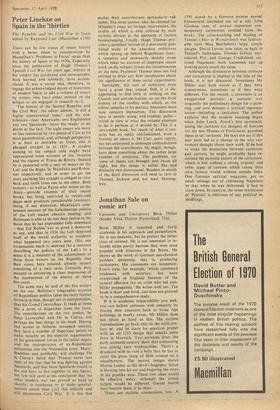Peter Linehan on Spain in the 'thirties
The Republic and the Civil War in Spain edited by Raymond Carr (Macmillan £3.90)
There can be few topics of recent history with a better claim to consideration by Macmillan's Problems in Focus' series than the history of Spain in the 1930s. Especially since the publication of Hugh Thomas's Spanish Civil War ten years ago, interest in the subject has quickened and monographs, both learned and scholarly, have accum- ulated. It was a sound idea, therefore, to engage the acknowledged doyen of historians of modern Spain to edit a volume of essays by writers who have either uttered on the subject or are engaged in research on it.
'The history of the Second Republic and the Civil War', the editor admits, 'is still a highly controversial topic', and his con- lributors—four Americans, two Englishmen and two Spaniards—leave the reader in no doubt of the fact. The eight essays are more or less connected by two pieces of Carr at his most parenthetical, and, although perspective is at least as desirable as focus, one is plunged straight in at 1831. A student coming to the subject cold might have appreciated some account of the 'twenties and the regime of Primo de Rivera. Instead he is presented with a pair of essays on the Left and the Right, by Malefakis and Robin- son respectively, and in order to get the story anything like straight is obliged to refer back and forth from one to the other. Both authors—as well as Payne who writes on the Army—provide résumés of their recent books, but being restricted to twenty-odd pages each produces considerable foreshort- ening, if not distortion. Malefakis's com- pressed account of the kaleidoscope politics of the Left makes obscure reading, and Robinson is able to do less than justice to the thesis that he has expounded fully elsewhere —that Gil Robles' was as good a democrat as any, and that in 1934 the Left deprived 'itself of the moral authority to condemn what happened two years later. (His one exclamation mark is reserved for a sentence describing the politics of the Left.) In a sense it is a measure of the achievement of these three writers on the Republic that their views, here restated, already impart something of a stale taste. Certainly they succeed in conveying a clear impression of the incoherence of the history of those live years.
The same may be said of the five writers on the war. Bolloten's telegraphic account of Republican politics takes the story further forward in time, though not in interpretation, than his Grand Camouflage. It reads at times like a series of dispatches from the front. The contributions on the two armies, by Salas Larrazabal and De la Cierva, are Perhaps the best things in the book. Having had access to hitherto untapped sources, they have a number of important points to make, notably on the superior organisation of the government forces in the initial stages, d the incorporation of ex-Republican militiamen into the Nationalist army. Many, doubtless and justifiably, will challenge De la. Cierva's belief that 'Franco never lost sight of the fact that he was fighting against SPaniards, and that these Spaniards would in the end have to live together in one Spain', but few will cavil at his conclusion that `no Other modern war has proved so hard to classify, to synthesise or to make general- isations about than [sic] this difficult and Still mysterious Civil War.' It is this that makes their contributions particularly val- uable. The same cannot, alas, be claimed for Whealey's essay on foreign intervention, the aridity of which is only relieved by such stylistic devices as the spectacle of factors boomeranging. Finally, Hugh Thomas pro- vides a modified version of a previously pub- lished study of the anarchist collectives which sprang up behind Republican lines: a tentative and necessarily sketchy essay which takes no account of important recent work on the subject. Given the circumstances of the time, Professor Thomas does not feel entitled to draw any firm conclusions about the significance of these social experiments.
Inevitably, this sort of collection must leave a great deal unsaid. Still, it is dis- appointing to find little or nothing on the Church and anti-clericalism, or on the local history of the conflict with which, as the editor remarks in his preface, historians must now concern themselves. The discussion here is mostly along well-trodden paths— which in view of what the volume attempts to do is perhaps as it should be. This is a serviceable book, but much of what it con- tains has an oddly old-fashioned, even a frowsty air about it. Mr Carr, quite rightly, has not attempted to eliminate contradictions between the contributors. He might, though, have done something about the rather large number of misprints. The problems (or some of them) are brought into focus all Tight, but the image is rather flat and distinctly two-dimensional. Readers in search of the third dimension will need to turn to Thomas, Jackson and, not least, Heming- way.






































 Previous page
Previous page